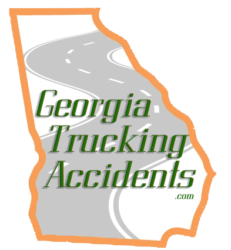The Common Causes of Truck Crashes in Georgia
Large truck crashes, like car crashes, can occur for any number of reasons. When large truck accidents do occur, they can leave a swath of devastation. Injuries from large truck crashes can range from relatively minor injuries to life-threatening injuries, dismemberment, disfigurement, and death. If you or a loved one was the victim of a large truck crash in Georgia, you should consider speaking with the experienced large truck accidents at Montlick & Associates. They have the knowledge, skill, and resources to effectively and zealously represent you and your family in a Georgia large truck accident claim.
It is important to your case to understand why the accident in which you or loved your one was involved occurred. One critical step in receiving financial compensation for your injuries is establishing causation. To prove negligence, you must prove who caused the accident. Failing that, you are not entitled to recover compensation for your injuries. The National Traffic Safety Board (NTSB) investigates many large truck and bus crashes. Their inquiries focus on several causes of large truck crashes. Through its numerous investigations, the NTSB has established the following as a list of common causes of trucking accidents:
- Loss of control over truck caused by a blowout, stalled engine, a wheel flew off, hood blew open, poor road conditions, and traveling too fast for road conditions.
- Large truck’s movement such as crossing an intersection, turning right or left, crossing over into another’s lane, and deceleration.
- Encroachment on the truck or movement into the truck’s lane by passenger car.
This list describes the event that occurred which made a crash imminent. These events can cause head-on collisions, rear-end collisions, undercutting, jackknifes, and rollover accidents.
The next question to ask, quite simply is why these events occurred that made a crash imminent. One of the most common issues plaguing drivers is fatigue. The Federal Motor Carrier Safety Administration issued strict rules designed to eliminate or reduce fatigued drivers. Tired drivers are as dangerous as drunk drivers. Fatigued drivers can fall asleep or nod off at the wheel. Consequently, they lose control over their rig. Sometimes drivers snap awake during such an event and realize that they are on a collision course with another motorist or other hazard, over-steer to regain control. Doing so can cause a jackknife or a rollover accident. Fatigued drivers are susceptible to making bad decisions on the road; suffer a loss of depth perception and concentration. Drivers must keep tight delivery schedules and are constantly working with little to no rest. Additionally, drivers who have sleep apnea that is left untreated tend to become fatigued more easily than a driver who is not suffering from a sleep problem.
There are other causes prevalent in the trucking industry. Drivers can lose control if their load shifts unexpectedly. Additionally, drivers can become distracted by cellphone usage. Drivers can also feel pressure to deliver their cargo within strict time limitations. Consequently, drivers can exceed the speed limit or drive faster than they should in the given conditions. Additionally, the NTSB has concluded that over 20% of all large trucks on the road have a mechanical defect that should prevent the driver from using that truck. The failure to do so leads to the inability of truck drivers to break timely, lose their breaks altogether, or experience tire failure.
Put Our Law Firm’s Over 33 Years Of Legal Experience To Work For Your Case!
The time you have to legally receive compensation is limited.
Sources:
https://www.ntsb.gov/safety/Documents/SafetyTips_FleetOwners.pdf
https://www.ntsb.gov/safety/safety-studies/Pages/SS9502.aspx
https://www.nytimes.com/2015/08/22/opinion/the-trucks-are-killing-us.html
https://www.fmcsa.dot.gov/safety/data-and-statistics/large-truck-and-bus-crash-facts-2015#A3

